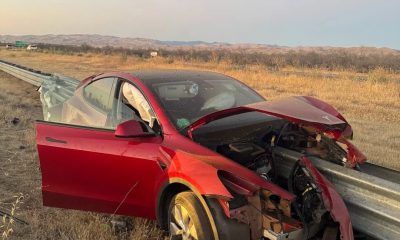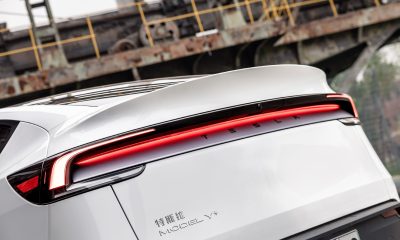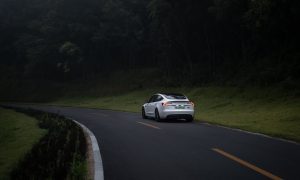News
Tesla vehicle reviews are pointless…Here’s why
This is a preview from our weekly newsletter. Each week I go ‘Beyond the News’ and handcraft a special edition that includes my thoughts on the biggest stories, why it matters, and how it could impact the future.
Tesla vehicle reviews are probably one of the most worthless things to read, in my own opinion, especially if they’re coming from a large group or entity with interests that anyone can trace through the money. Earlier this week, Edmunds put up a scathing review of the Model S Plaid, calling it “a waste of money” and saying it was nothing more than a marketing tool to make an aging vehicle relevant once again. Despite these words, which caught the attention of many readers within the first 48 hours, the Edmunds driver couldn’t wipe the large, shining smile from his face as he felt the instant torque of the vehicle take off like a rollercoaster.
For something that is such a waste, it sure provided a lot of enjoyment to the Edmunds staff. Of course, vehicle performance is not necessarily a baseline for whether an automobile is “good” or not. If a car is fast, people will like it because fast cars are just fun to be in, whether you’re a driver or a passenger. However, reviews on electric cars, Teslas in specific, do not get a fair shake, and it’s not necessarily anyone’s fault, per se. Instead, I see it as an opportunity for people to put their opinions out there without speaking in generalities or thinking their point of view is a fact. Of course, you could say the same about this newsletter.
For me, the comprehension of electric cars, Teslas in specific, needs to be examined by someone seasoned and completely understanding what is going on under the hood (I use that term loosely, now) because without the basic comprehension of what you’re driving, you really are not qualified to speak on it. Additionally, whether something is a “waste of money” really comes down to the consumer. If you’re buying a Model S Plaid for the performance statistics, you’re getting the fastest car in the world for millions of dollars less than its competitors. Sure, if you’re buying it for range and a daily driver, it could be considered a “waste” as the Long Range variant is likely a better option. However, some people realize they won’t have their money forever, and the additional $40,000 cost is simply arbitrary in their point of view.
For me, there are just too many factors as to why reviews are pointless when it comes to certain cars, especially with fast ones. I will discuss a few of them here, and I look forward to hearing your point of view with the others.
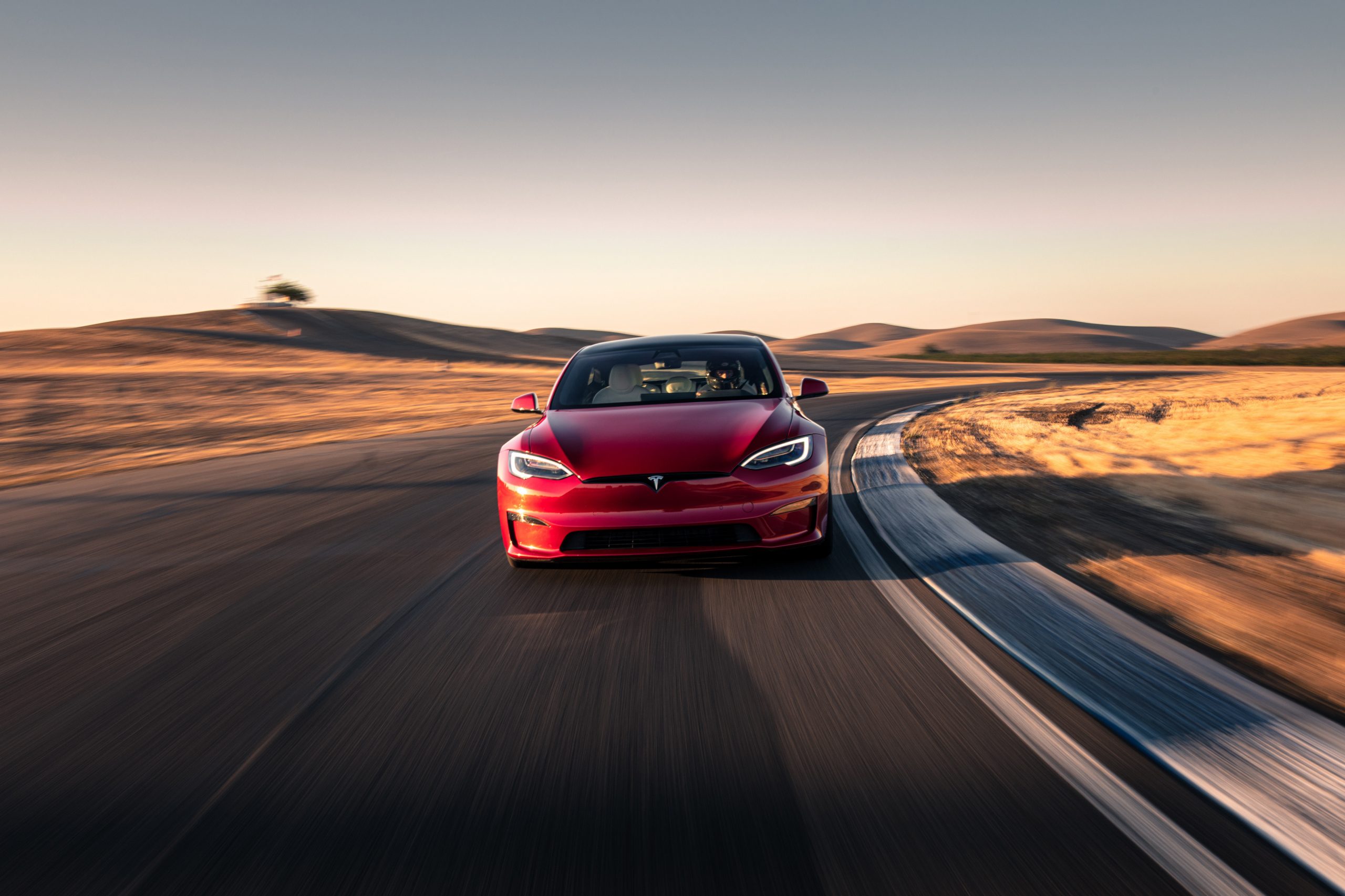
Credit: Tesla
Internal Interests
Tesla fans are quick to point out when a product gets a negative review or any sort of pushback. Many of them claim inside interests without really doing their own due diligence, claiming that some entities have their pockets lined with oil money or anything else the mind can grasp. Sometimes, however, they’re not far off. CarMax purchased Edmunds back in April, which means that the company is no longer independent and is owned by a large company with ties with Chrysler, Mitsubishi, Toyota, and Nissan.
It is always important to see what interests some entities have when they speak about a car or any product, for that matter. Simply enough, people with the ability to put their name on an article or a video and put it out there for millions of people to digest have a responsibility to remain partial. It doesn’t always work that way.
Opinionated Points on Features
This is one of my biggest points. Edmunds was quick to dismiss the usefulness of the Yoke, claiming that “the Yoke was a Joke.” Yes, they really wrote that on Twitter.
The Tesla Model S Plaid is nothing more than a marketing exercise designed to draw attention to an aging car. Also, the yoke is a joke. Our full review of the fastest car we’ve ever tested: https://t.co/f1SkdDmRhI pic.twitter.com/A1UUKWODEV
— Edmunds (@edmunds) September 7, 2021
The thing is, I have monitored the Yoke since it was going to be included in the Model S, and while I have spoken to numerous government agencies and Tesla employees about the Yoke, the wheel is really personal preference. The car is obviously built for performance, and performance vehicles, especially open-wheeled cars, like F1 series vehicles, use a Yoke for complete control at high speeds. It is likely Tesla didn’t go with the Yoke for this reason, but it may have included it as a hint toward a steering wheel-less cockpit in the future. That’s my idea, anyway, especially as the company surges toward autonomy.
I have NEVER come across a single person who has disliked driving the Yoke for what it’s worth.
Of course, a review does include some personal preference, and that’s expected. However, to slash a vehicle in this way that is likely the most advanced car on the market in terms of software, performance, and technology in this way smells of too much opinion, for me. Stick to the facts, is it a good car? Is it functional? Does it do what the automaker said it would do?
Cars are made to be tested individually
The most logical way to know if a car is for you is to drive it yourself. You should never go off of someone else’s opinion completely. It makes no sense to do this. If cars were meant to be bought off of the basis of someone else’s experience, nobody would drive PT Cruisers (they’re horribly ugly), and everyone would drive what someone else wanted them to drive. Let’s not forget: Cars, while a meaningful portion of life because they get us to work, events, and anywhere we need to go, are supposed to be enjoyable and fun. Not one person on this Earth wants to drive a car they hate if they don’t have to. Hell, when my Dad bought me a 2003 Taurus in college because my Jetta died, I hated it. It was like driving a boat. I was embarrassed by the putrid blue color. I hated the seats, the stereo, and in the winter, I had to keep one hand on the driver’s door because the latch wouldn’t work, and the part was on backorder. There is nothing like driving on the interstate to get to class on time and holding the door shut for dear life, hoping you don’t roll out. I had no other choice, I was a broke college kid, and it was a car that got me from Point A to Point B. But I will never again drive a car I hate.
The thing is, someone I went to high school with loved their 2003 Taurus. They talked about its powerful V6 engine and its fine leather interior. It was a car they enjoyed. I am sure it was a nice car, I didn’t like it.
This goes to my point: Just because someone else hates it and thinks it is a pile of junk doesn’t mean it actually is. It’s just an opinion. Do you want to know if a car is good or not? Drive it yourself and tell your friends what you thought of it. Your opinion of the car won’t change theirs.
I will say this: It is important to have these pieces of literature to show us the negative portions of a car. Like if the software isn’t great, or the touchscreen is not very responsive, or if the center console doesn’t move properly. Those are understandable pieces of criticism, but none of them are opinionated. If the software isn’t great, people will see that. It might keep them from buying a car prematurely.
With all of that being said, there is plenty of evidence to suggest the Plaid Model S is a great vehicle, and there is other evidence that suggests Tesla has things to work on. Whichever side of the ball you’re on, believe in your opinion, but be open to other’s points as well. Additionally, make the final decision about a car on your own time, don’t go off of someone else’s words. That’s how you end up with something that you really do not enjoy driving.
A big thanks to our long-time supporters and new subscribers! Thank you.
I use this newsletter to share my thoughts on what is going on in the Tesla world. If you want to talk to me directly, you can email me or reach me on Twitter. I don’t bite, be sure to reach out!
News
Tesla driver walks away from major accident with minor injuries
The driver sustained only minor injuries, and the exact cause of the crash remains under investigation.
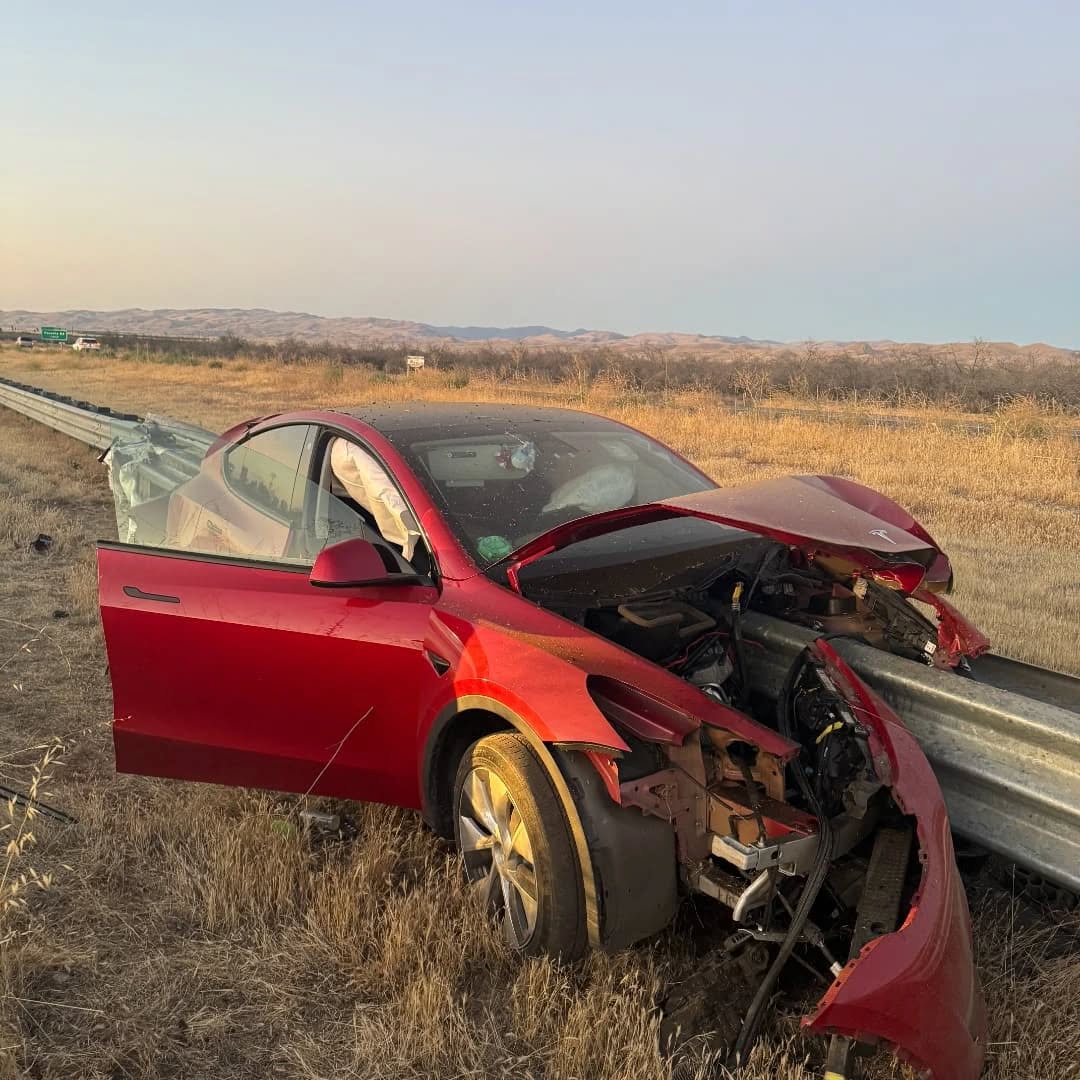
The driver of a Tesla Model Y survived and walked away from a harrowing accident on Monday in California, only sustaining minor injuries despite the vehicle being impaled by a guardrail.
On Monday morning around 4:34 a.m., the Los Banos division of the California Highway Patrol (CHP) responded to the accident on I-5 near Panoche Road, involving a 23-year-old in a Tesla Model Y. According to a post on social media, the driver veered off the road for unknown reasons in the northbound lane, before crashing directly into the guardrail and impaling the vehicle.
You can read the full message and photos from Los Banos CHP below, as were shared in a Facebook post on Monday afternoon.
This morning a Tesla model y was traveling in the #1 northbound lane of I-5 north of Panoche Rd. For unknown reasons driver allowed V-1 to veer off the roadway, travel through a dirt center divide, and crashed into the fixed metal guardrail. Lucky for the driver he only sustained minor injuries and was able to walk away. Driving a vehicle requires 100% attention to the road. Avoid distractions and focus on driving.
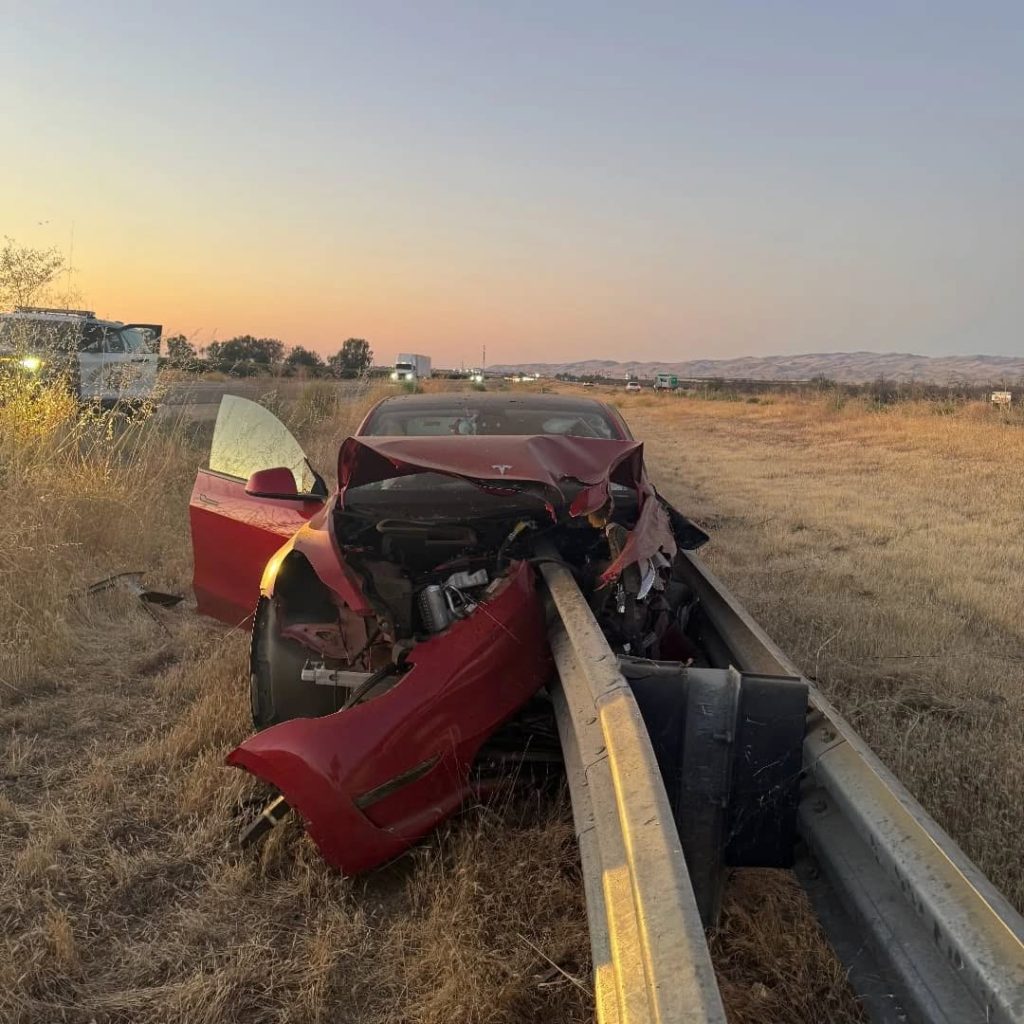
Credit: CHP Los Banos (via Facebook)
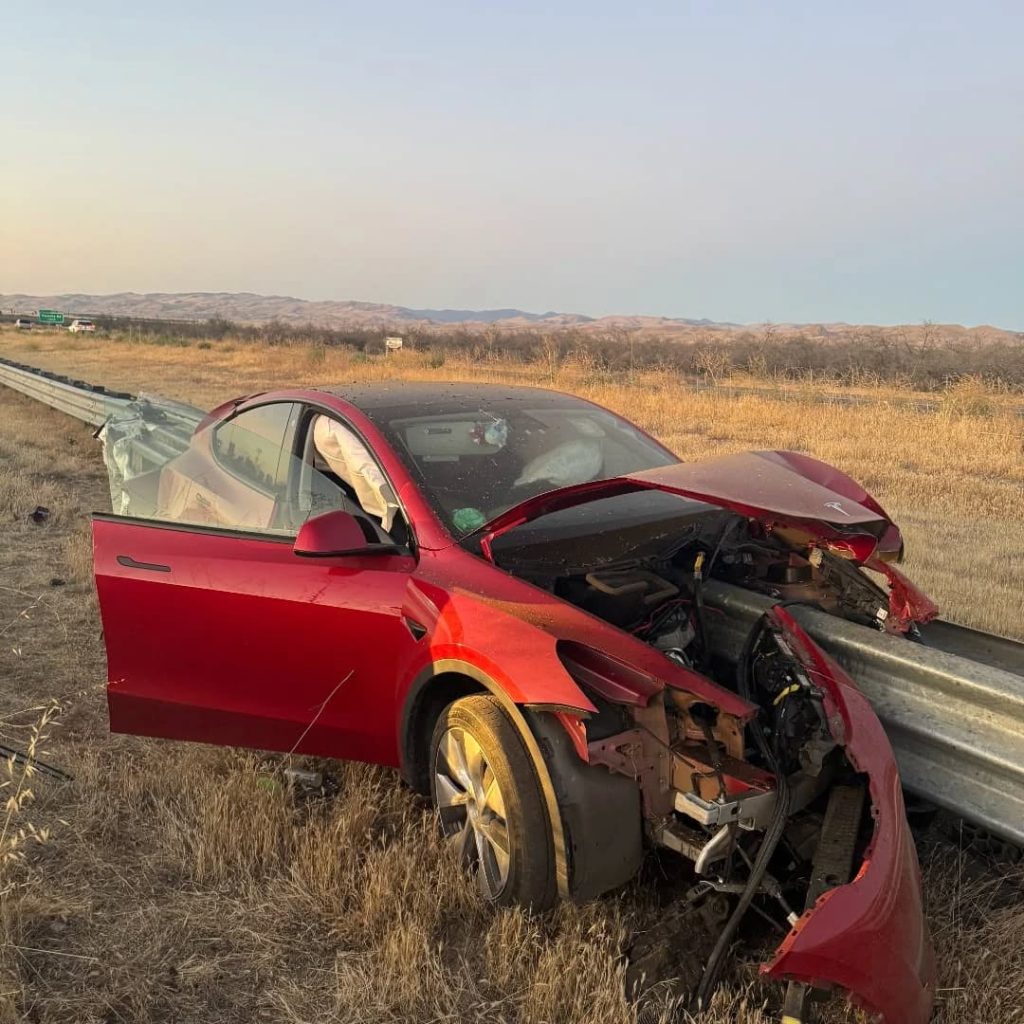
Credit: CHP Los Banos (via Facebook)
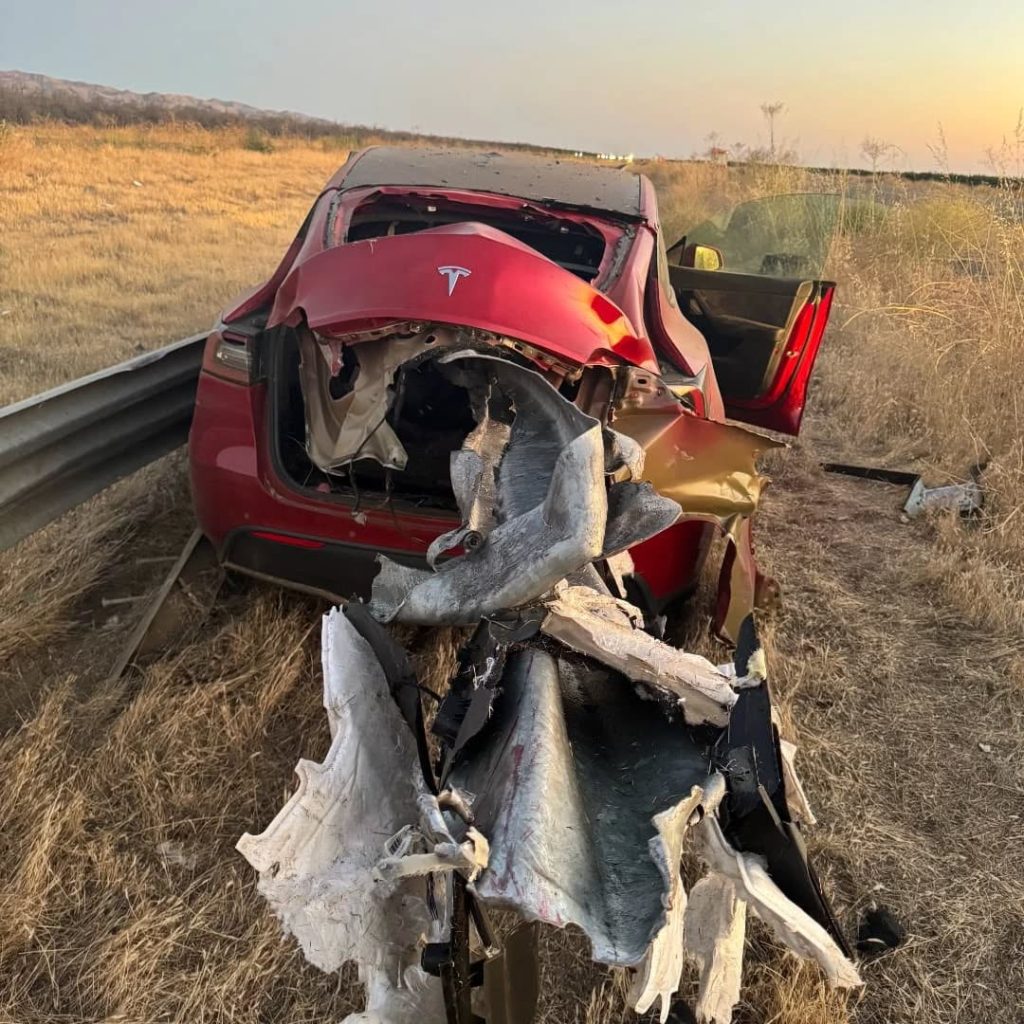
Credit: CHP Los Banos (via Facebook)
In a statement to SFGate, CHP officer Myles Anderson said that the driver only sustained minor injuries, while no arrests are made and drugs and alcohol are not suspected to have been involved. The report also notes that Tesla’s “cruise control and lane assistance features” were activated, according to Anderson. However, it’s not entirely clear if this is referring to Supervised Full Self-Driving (FSD), or to the cruise control and lane assist features baked into Autopilot.
At the time of writing, CHP has not yet responded to Teslarati’s request for clarification and additional details on the matter.
Tesla Crash Safety Ratings across its lineup: pic.twitter.com/ny30R7ceji
— TESLARATI (@Teslarati) July 1, 2025
READ MORE ON TESLA SAFETY: Tesla rolls out crucial new safety feature aimed at saving children
The news comes after Tesla has touted its vehicles as incredibly safe for many years. In December, for example, the company highlighted receiving top safety scores from regulators on four different continents throughout the world, including from the National Highway Traffic Safety Administration (NHTSA) and the Insurance Institute of Highway Safety (IIHS) in the U.S.
Tesla has also listed the goal of making its vehicles the safest on the road throughout the years, both in the overall design of its vehicles and in its Autopilot and Full Self-Driving (FSD) programs.
Tesla Model 3 ranks as the safest new car in Europe for 2025, per Euro NCAP tests
Investor's Corner
Cantor Fitzgerald maintains Tesla (TSLA) ‘Overweight’ rating amid Q2 2025 deliveries
Cantor Fitzgerald is holding firm on its bullish stance for the electric vehicle maker.

Cantor Fitzgerald is holding firm on its bullish stance for Tesla (NASDAQ: TSLA), reiterating its “Overweight” rating and $355 price target amidst the company’s release of its Q2 2025 vehicle delivery and production report.
Tesla delivered 384,122 vehicles in Q2 2025, falling below last year’s Q2 figure of 443,956 units. Despite softer demand in some countries in Europe and ongoing controversies surrounding CEO Elon Musk, the firm maintained its view that Tesla is a long-term growth story in the EV sector.
Tesla’s Q2 results
Among the 384,122 vehicles that Tesla delivered in the second quarter, 373,728 were Model 3 and Model Y. The remaining 10,394 units were attributed to the Model S, Model X, and Cybertruck. Production was largely flat year-over-year at 410,244 units.
In the energy division, Tesla deployed 9.6 GWh of energy storage in Q2, which was above last year’s 9.4 GWh. Overall, Tesla continues to hold a strong position with $95.7 billion in trailing twelve-month revenue and a 17.7% gross margin, as noted in a report from Investing.com.
Tesla’s stock is still volatile
Tesla’s market cap fell to $941 billion on Monday amid volatility that was likely caused in no small part by CEO Elon Musk’s political posts on X over the weekend. Musk has announced that he is forming the America Party to serve as a third option for voters in the United States, a decision that has earned the ire of U.S. President Donald Trump.
Despite Musk’s controversial nature, some analysts remain bullish on TSLA stock. Apart from Cantor Fitzgerald, Canaccord Genuity also reiterated its “Buy” rating on Tesla shares, with the firm highlighting the company’s positive Q2 vehicle deliveries, which exceeded its expectations by 24,000 units. Cannacord also noted that Tesla remains strong in several markets despite its year-over-year decline in deliveries.
News
Tesla Sweden responds to car magazine’s claims that Model 3 has deficient brakes
The company stated that it would be examining the two Model 3s that were used in the magazine’s test.
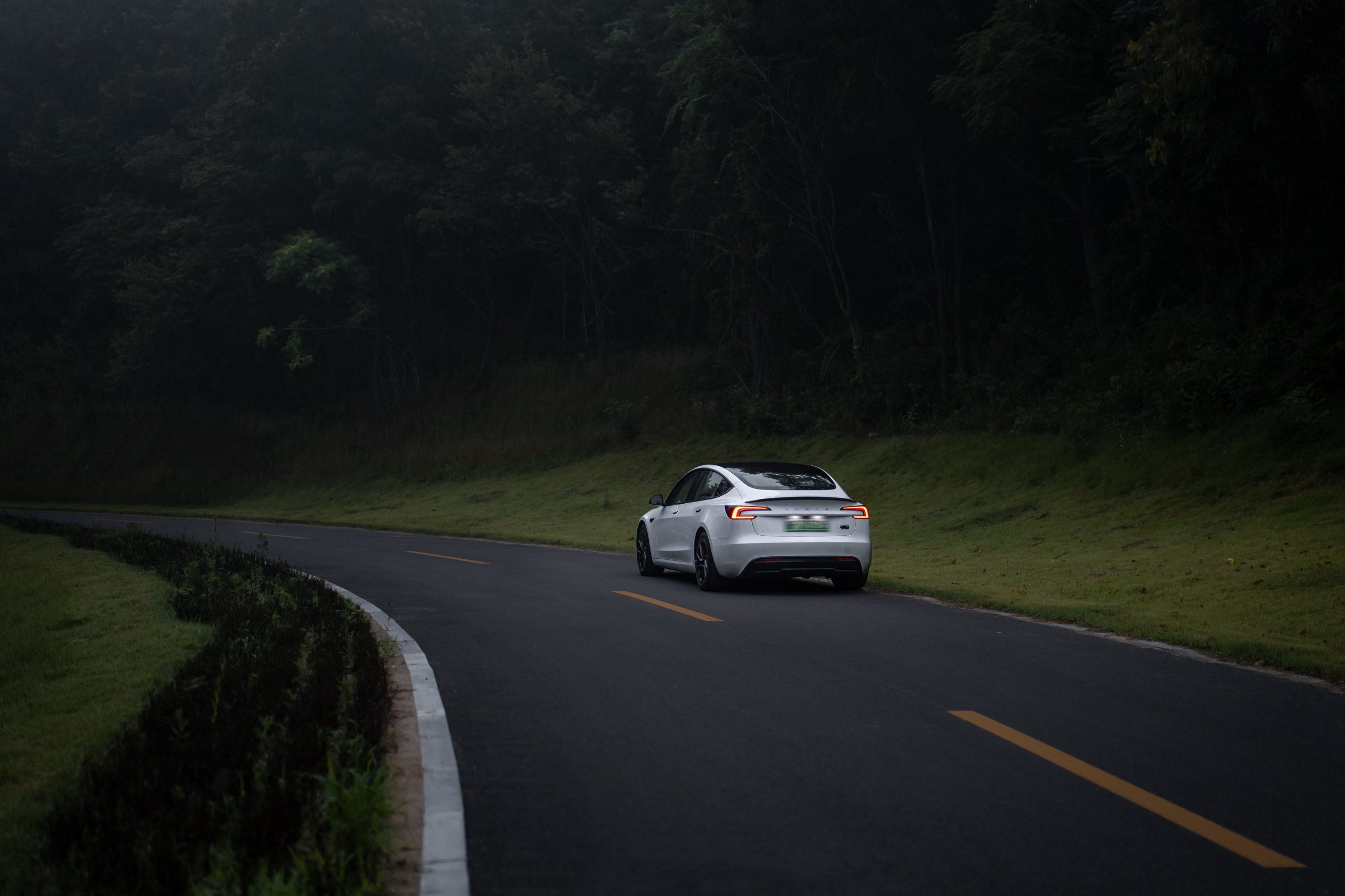
Tesla Sweden has responded to a car magazine’s claims that the new Model 3 sedan has “deficient” brakes. The all-electric sedan was subjected to the publication’s tests, and its braking distance was reportedly found to be lacking.
The car magazine’s tests
As noted in a report from Swedish car magazine Teknikens Värld, the new Model 3 Long Range’s braking distance proved subpar when it was tested, with the vehicle reportedly having a braking distance of a whopping 133.2 feet (40.6 meters). The magazine claimed that it repeated the test with another Model 3, and its results were only 5 feet (1.5 meters) better.
The magazine noted that this was unacceptable since an acceptable braking distance is 124 feet (28 meters), which also happens to be the Model 3’s braking distance when it was tested by Edmunds in the United States. The publication also stated that the Volkswagen ID.7 Tourer, which is equipped with drum brakes at the rear, had a braking distance that’s 16 feet (5 meters) shorter in its tests.
Tesla Sweden’s response
Tesla Sweden responded to the car magazine’s claims, stating that the all-electric sedan’s alleged braking performance was not consistent with the company’s data, nor does it align with the Model 3’s safety ratings. The company also noted that it would be examining the two Model 3s that were used in the magazine’s test.
“In the latest braking tests with Model 3, which were conducted by Teknikens Värld 2021, a braking distance of 36.5 meters was measured for Model 3 RWD and 36.7 meters for Model 3 Long Range AWD, so these results are not recognized or consistent with our internal tests.
“We are examining the two specimens to find out why the braking distances differ. Safety is number one at Tesla. Model 3 comes with all safety features as standard. Independent crash safety organization Euro NCAP recently announced new crash results for cars tested in May 2025. Euro NCAP gives the upgraded Model 3 a 5 out of 5-star safety rating and an overall score of 90%, making Model 3 one of the safest vehicles tested under the latest and most stringent testing protocol ever,” Tesla Sweden stated.
Teknikens Värld digs its heels
While Tesla Sweden has responded to its allegations, the car magazine noted that it will nonetheless stand firm on its claim that the new Model 3 has deficient brakes.
“The fact that the Model 3 previously passed the brake test is not relevant because today’s generation of the Model 3 is to be considered a new generation, as Tesla themselves often point out. Nor is the result in Euro NCAP relevant because they are different tests. We can therefore conclude that Tesla has deficient brakes on the new Model 3. It is good for everyone to know,” the car magazine wrote.
-

 Elon Musk1 week ago
Elon Musk1 week agoTesla investors will be shocked by Jim Cramer’s latest assessment
-

 News2 weeks ago
News2 weeks agoTesla Robotaxi’s biggest challenge seems to be this one thing
-

 News2 weeks ago
News2 weeks agoWatch the first true Tesla Robotaxi intervention by safety monitor
-

 Elon Musk1 week ago
Elon Musk1 week agoA Tesla just delivered itself to a customer autonomously, Elon Musk confirms
-

 News2 weeks ago
News2 weeks agoTesla Robotaxi rollout proves that Elon Musk still delivers, even if it’s late
-

 Elon Musk2 weeks ago
Elon Musk2 weeks agoxAI welcomes Memphis pollution results, environmental groups push back
-
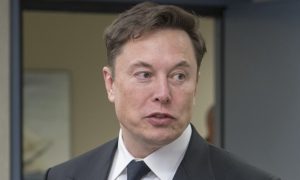
 Elon Musk2 weeks ago
Elon Musk2 weeks agoElon Musk commends Tesla team on successful Robotaxi launch
-

 Elon Musk2 weeks ago
Elon Musk2 weeks agoElon Musk confirms Tesla Optimus V3 already uses Grok voice AI


